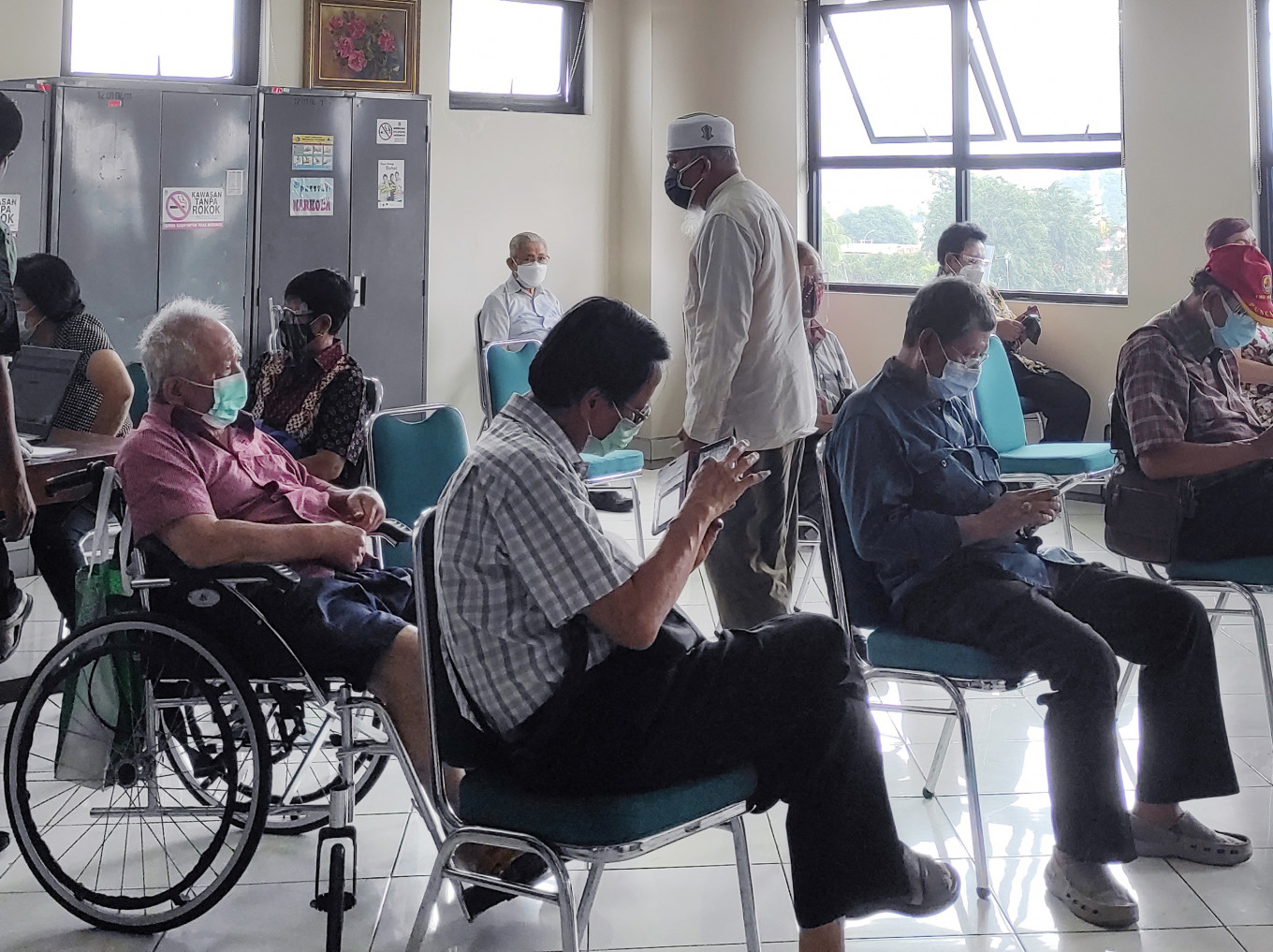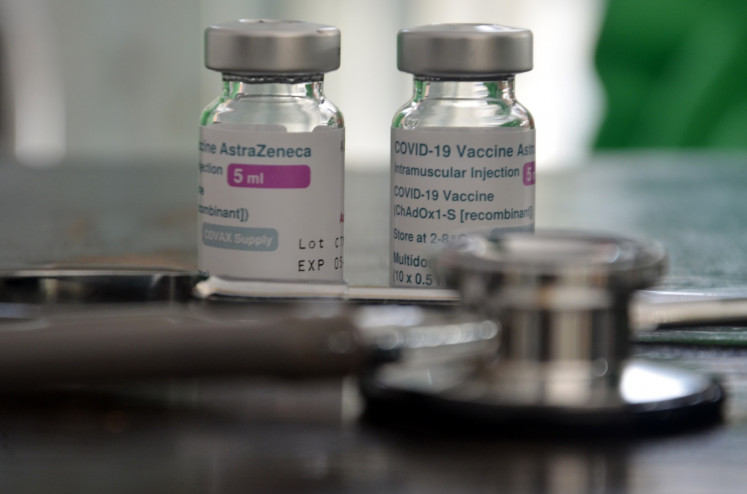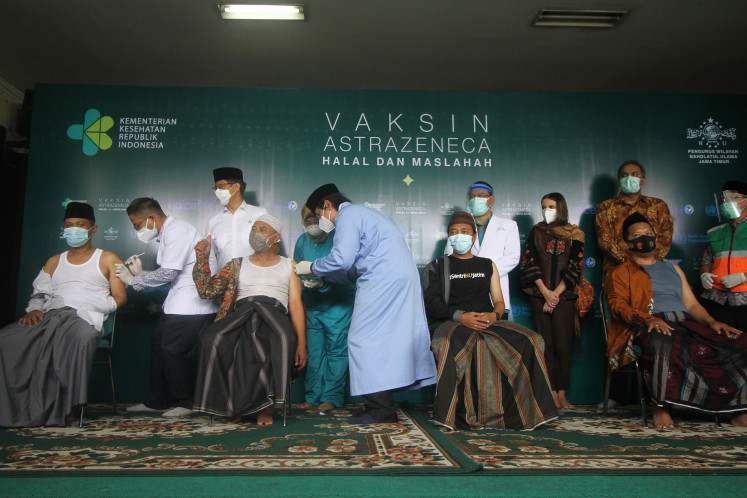Popular Reads
Top Results
Can't find what you're looking for?
View all search resultsPopular Reads
Top Results
Can't find what you're looking for?
View all search resultsReality check for RI jab drive as supply falters
Arrival of 100 million doses from AstraZeneca ‘uncertain’
Change text size
Gift Premium Articles
to Anyone
F
or months, the government promised the people of Indonesia that it would secure hundreds of millions of doses of COVID-19 vaccines from various international partners.
Its timely vaccine diplomacy made Indonesia among the first few countries in Asia to get a head start on its vaccination drive – and supporters of the state were quick to remind any detractors of this fact.
But as the reality of the recent embargo-induced global shortage of vaccines slowly sinks in, the government can no longer deny that Indonesians might have to wait longer than promised for their jabs, if only because of a growing sense of protectionism among vaccine-producing countries.
The nation is slowing down its vaccine roll-out to account for limited supplies following shipment delays of 10 million doses of the AstraZeneca vaccine via the multilateral COVAX-GAVI fair distribution facility. It also faces possible delayed deliveries for a further 30 million doses in a separate bilateral arrangement with the producer.
The government is mitigating these potentially lost doses by negotiating to secure between 90 million and 100 million doses of COVID-19 vaccines from China. It has put the blame on other countries, although experts have been warning of possible shortages for months.
"The world’s vaccine-producing countries are very protectionist," Health Minister Budi Gunadi Sadikin said during a virtual discussion on Tuesday.
Budi revealed in a meeting with members of the House of Representatives Commission IX overseeing health care and manpower on Thursday that AstraZeneca Indonesia would only be able to deliver 20 million of the promised 50 million doses this year, starting from June.
The remainder is slated to arrive in the first half of 2022, though he added that the government had told the British-Swedish company that it could not accept the delay.
Read also: Indonesia receives first AstraZeneca vaccines under COVAX facility
Supply chain hiccup
Indonesia has so far received 1.1 million doses of the AstraZeneca vaccine via the COVAX facility and was expecting more to help cover the inoculation of over 38.5 million elderly and public workers – its second priority group – in March and April. It expects a total of 54 million doses from the multilateral arrangement until the end of this year.
But the World Health Organization (WHO) issued a statement late last month informing countries of a delay in shipments due to increased demand in India, which manufactures supplies for the COVAX facility.
India is currently battling a new wave of COVID-19 infections that saw its daily number of new cases surpass 100,000 for the first time on Monday.
“Until today, the [scheduled arrival] of 100 million doses of vaccines is still uncertain,” Budi told lawmakers.
The delay is also expected to push back plans to inoculate the country’s third priority recipient group, comprising over 60 million people who reside in areas with a high risk of transmission. A December road map of the vaccination program puts the start of this group’s inoculation in April, but this has changed in the Health Ministry's most recent timeline.
Adjusted to existing vaccine supplies, the ministry now expects to administer between 100,000 and 500,000 doses per day in April with the incoming 20 million doses, between 500,000 and 1 million doses per day in May and June with the expected arrival of 50 million doses and between 1 million and 1.5 million doses per day from July until December with 250 million doses set to arrive gradually within that time frame.
A photo taken on March 22 shows vials of AstraZeneca COVID-19 vaccine before being inoculated to residents of Jombang regency, East Java. President Joko "Jokowi" Widodo oversees the vaccination drive for 2,500 religious teachers in the regency. (Antara/Syaiful Arif)The problem with pledges
The Health Ministry initially planned to inoculate 181.5 million people, about 70 percent of the total population, within 15 months, but President Joko “Jokowi” Widodo has called for the vaccine rollout to be concluded within a year.
The pandemic has hit Indonesia hard, with more than 1.5 million virus cases and over 42,000 deaths. On Thursday, the country logged 5,504 new COVID-19 cases and 163 new deaths.
Jokowi has repeatedly claimed that the country has booked 426 million doses of COVID-19 vaccines that would be delivered gradually in small batches over the first few months of 2021.
But based on rough estimates and the assumption that one person gets two jabs, that would mean that 1 million doses would need to be administered every single day this year. Even if the pace reaches 1.5 million doses per day from July onward, roughly 500,000 doses would have had to be administered each day from January until then.
Another problem with the figure the President has boasted about is that it includes 50 million doses of a vaccine produced by American firm Pfizer, which has yet to finalize an agreement with the government and is as such non-binding.
With the new wave of infections further complicating vaccine procurement, many of the pledges that seemed set in stone are now likely subject to change.
The document Budi shared during Thursday’s hearing shows that Indonesia plans to gradually receive a total of 125 million doses of a vaccine from Chinese firm Sinovac Biotech by the end of 2021.
The plan, until the end of this year, also includes 5 million doses from United States firm Novavax starting in June, 54 million from the COVAX facility in March, 50 million from AstraZeneca starting from the second quarter of this year and the 50 million doses from Pfizer in July.
In total, the country is expecting 329.5 million doses by the end of 2021.
Impacts on other plans
The Health Ministry said it was still negotiating with Novavax on delivery and that the AstraZeneca doses it had secured in bilateral agreements would be manufactured by Thailand.
A Reuters report in January quoted a Thai official as saying that the country would produce industrial batches of the AstraZeneca vaccine by June with a capacity of up to 18 million doses per month – although it remains unclear how much of this would be distributed to other Southeast Asian nations.
The European Union has also held on to locally produced vaccines amid a third wave of infections and production glitches, with Reuters reporting that it has also requested AstraZeneca doses from India.
Meanwhile, Novavax was recently reported to have delayed its deal with the EU over production issues.
Tight global competition, vaccine nationalism and supply chain glitches have been among the main issues that various experts warned about to avoid overglorifying vaccinations as the only way toward recovery.
Early access afforded to celebrities and relatives of lawmakers has also sparked anger, at a time when people with comorbidities and those working as caretakers for others have not been made a top priority in the vaccination campaign, unlike in other countries.
Read also: Indonesia cautions against 'vaccine nationalism'
Now that vaccine supplies are more limited, critics are calling on the government to set its priorities straight, such as inoculating the nation’s 21 million elderly citizens first.
Health Ministry spokeswoman Siti Nadia Tarmizi has said that the ministry had asked regional administrators to allocate 60 percent of their doses for the elderly. So far, just 1.8 million seniors have gotten their first jabs, unlike the 5.8 million public workers already immunized.
“Many [seniors] are still hesitant, can’t go [and get the jab] on their own, don’t have the money [to make the commute] or can’t register themselves,” she told The Jakarta Post on Wednesday.
Budi told legislators on Thursday that of the 513 cities and regencies rolling out vaccinations nationwide, 494 have yet to reach 25 percent of their targeted senior recipients, while the other 19 regions have yet to start inoculating the elderly.
Health Minister Budi Gunadi Sadikin (third left) oversees the vaccination drive against young cleric from Nahdlatul Ulama (NU) in Surabaya, East Java on March 23. One-hundred NU young clerics are inoculated using the AstraZeneca vaccine, which is declared 'haram' (forbidden) by the Indonesian Ulema Council (MUI) for using pork-derivative product during its production. (Antara/Moch. Asim)Alternatives 'neglected'
As a university student from West Bandung regency in West Java, 19-year-old Adinda Triana Putri is wary of bringing home the novel coronavirus to her 64-year-old father, who has a history of stroke and claims not to have received any information about the vaccination campaign, let alone the vaccine itself.
Meanwhile, workers and neighborhood leaders from her area have all received their jabs, Adinda said. She wishes her father could be vaccinated soon.
Her concerns are not without merit; COVID-19 cases nationwide have not seen a significant reduction, despite the government boasting about having administered over 10 million doses of vaccines. While daily new figures have declined to around 5,000 cases, testing has yet to improve significantly, even with the inclusion of rapid antigen tests as a diagnostic tool.
The number of daily tests performed has barely reached beyond 50,000 as of late. The government has resorted to the use of locally developed screening method Genose on travelers, much to the dismay of some experts who still question its validity amid limited trial data. Positivity rates, which denote the share of tests that come back positive, are also still twice as high as the 5 percent target that indicates an outbreak is contained.
Read also: Military, police to be deployed for contact tracing, protocol enforcement
“[Administered second jabs are] still at around 2 percent [of the total target]. Meanwhile, other programs are being neglected, forgotten, undermined and negated,” Masdalina Pane of the Indonesian Epidemiologists Association (PAEI) said on Wednesday.
For instance, the 7,000-plus paid volunteers who were involved in the contact-tracing program since November 2020 will be replaced in April with tens of thousands of Indonesian Military (TNI) non-commissioned officers (Babinsa), as well as officers from the National Police’s security and public order unit (Bhabinkamtibmas), Masdalina said.
"I don't think the government is concerned about containment, so I'm not sure where we're headed," she said.
Back to school?
The vaccine rollout also helps determine when schools can reopen after over a year of virtual instruction that has widened the gap between the haves and have-nots. Any delay could put the plan to reopen schools by July – after teachers are vaccinated – in jeopardy.
Satriwan Salim, the national coordinator of the Association for Education and Teachers (P2G), has said that if the pace of the vaccine rollout did not pick up, schools risk not being able to reopen as scheduled. Some regions have not even started vaccinating their teachers, he added.
Education and Culture Minister Nadiem Makarim said in an online discussion on April 1 that as of March 31, only around 550,000 of the targeted 5.5 million teachers and lecturers had received their jabs.












